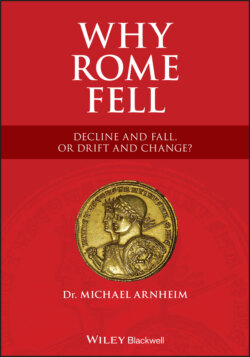Читать книгу Why Rome Fell - Michael Arnheim - Страница 44
Polybius Was Right
ОглавлениеUp to now we have been concerned with the tendency on the part of certain modern writers to dismiss large amounts of ancient evidence out of hand, with the danger of throwing the baby out with the bathwater. We now come to the opposite tendency, namely to accept too uncritically certain other ancient evidence. Some writers even have managed to combine both these opposite tendencies in the same book. One particularly disquieting tendency is to accept too readily any suggestion that the Roman Republic was democratic and even that the Principate of Augustus had democratic elements.
The evidence is quite clear, however, that the Roman Republic was an oligarchy or an aristocracy controlled by a senatorial elite, which, however, was open to novi homines. This is a modified version of the traditional view that can be traced back to Matthias Gelzer’s Nobilität der römischen Republik (1912). Until the 1980s there was a basic consensus, in the words of Professor Karl-Joachim Hölkeskamp, “that the social and political order of the libera res publica (free republic) had been aristocratic or even ‘oligarchic’, meaning that all institutions and positions of power were controlled by a particular kind of ruling class, which recruited not only magistrates, generals, priests, and senators from its ranks, but also the official representatives of the people, the tribuni plebis.” (Hölkeskamp 2010, p. 86.) This picture emerged largely from prosopographical research. Since Gelzer’s classic study, the existence of a “…complex system of patron-client relations” underpinning the political structure of the Republic had “…been generally accepted without further discussion.” (Ibid.)
This consensus was broken by Fergus Millar, who, following Peter Brunt, not only poured scorn on the whole idea of the significance of patronage (clientela) but even “flatly denies the existence of the nobility or of any homogeneous patrician-plebeian political elite in general; for him, to put it in a nutshell, neither an aristocracy nor an oligarchy ever existed in Republican Rome.” (Hölkeskamp, 2010, p. 108.) Instead, unduly impressed by the fact that elections and legislation were decided by popular assemblies, Millar even went so far as to refer to the “direct democracy” of the Republic:
In the light of recent work, it is time to abandon the once established presuppositions of a hereditary ‘nobility’, of aristocratic factions, and of an all-embracing network of dependence and clientship. We might then be able to see the public life of the classical Republic in a rather different light: as an arena in which those who sought and held office competed before the crowd…. It was this crowd which, however imperfectly, symbolized and represented the sovereignty of the Roman people. (Millar 2002, p. 141 f.)
And again: “Using ‘democracy’ in a strictly neutral sense, it is undeniable that the constitution of the Roman Republic was that of a direct democracy” (p. 165). This appears to relate to the period around 150 BCE. That Millar was not referring only to the legal or constitutional position but also to political realities on the ground is clear from the longer passage quoted above, and in addition from the writings of Millar’s staunch defender, T.P. Wiseman: “Fergus Millar forcefully insisted on the centrality of the People’s role in the political life of the republic.” (Wiseman, loc 76. referring to Millar 2002a, pp. 109–42.)
The first question to ask is what Polybius actually said. Then, whether he should be believed. And, if not, what was the true position? The response to these questions is as follows:
Polybius did not say that the Roman Republic was a democracy;
His reference to democracy in this connection has been misconstrued;
What Polybius actually said was that the Roman Republic had a “mixed” form of government, combining monarchy, aristocracy, and democracy;
In reaching this conclusion, Polybius was unduly influenced by the tradition of constitutional classification by a long line of Greek writers culminating in Aristotle; and
The true position is that the Roman Republic was an oligarchy, meaning rule by an elite minority or an aristocracy, namely a hereditary oligarchy, which, however, was not closed to novi homines.
